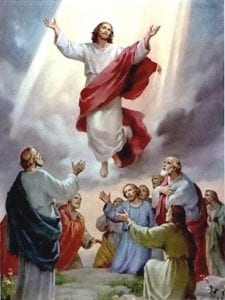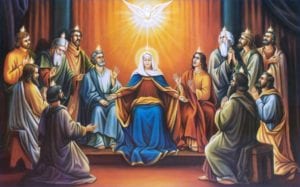
The Ascension of the Lord
The Ascension is an important event not only in the life of Christ but also in the life of the Church. The two primary scripture passages on the Ascension are found in the Gospel of Luke (24:50-51) and the Acts of the Apostles (1:9-11). The event of the Ascension, which took place forty days after the Resurrection, links the life of Jesus in the Gospels to the life of the Church in the Acts of the Apostles. The Ascension also paved the way for the coming of the Holy Spirit at Pentecost, which ushered in the age of the Church. Scripture asserts that the Ascension was the necessary condition for the descent of the Holy Spirit, for it says that the Spirit will come only when Christ has been glorified (Jn 7:37-39; 15:26; 16:7; Ac 1:4-11).
With His Ascension, Jesus left His disciples on earth and reunited with His Father in heaven. Why is the mysterious absence of Christ important for the Church? What does it achieve? On the one hand, it confirms that Christ appears before the Father as the sole Mediator on behalf of humanity (Heb 9.24). On the other hand, Christ’s absence calls us to faith. The Gospel of John is strongly rooted in the idea that Christ’s absence is beneficial for faith. Jesus said: “It is to your advantage that I go away (Jn 16:7)” and “Blessed are those who have not seen and yet have come to believe (Jn 20:29).” Christ appeared to the disciples many times after the Resurrection so that they might believe the reality of His Resurrection; however, it was His Ascension that made it possible for them to no longer think of Him merely in a bodily sense. Like the disciples, we are called to contemplate the ascended Christ through faith.
The action of the Trinitarian God in salvation history is that the Father sends the Son, in order that the Son may live, die, rise, and ascend in the flesh, so that the Spirit may come and bestow on us the gift of faith which unites us with the Father, through the Son, and by the Holy Spirit. Having an awareness of this Trinitarian action allows us to experience the love of God and the grace of Christ in the fellowship of the Spirit.
The Ascension of Jesus’ resurrected body does not mean that Jesus can never be present to us in this world. By the power of the Holy Spirit, Jesus is made present to us sacramentally in the Eucharist. The Eucharist does not immediately usher us into heaven, but it gives us the strength to journey to heaven. The real presence of Christ in the Eucharist is Jesus’ way to make Himself present to us, even after He has ascended into heaven. The last thing that Jesus said in the Gospel of Matthew was: “I am with you always, until the end of the age (Mt 28:20).” Jesus meant it in a very real sense and the Eucharist fulfills that promise.
Memo: Instructions on the resumption of in-parish worship and access to parish facilities
- The faithful are dispensed from attending Mass until Sunday, June 28, 2020.
- For those who wish to come to church to attend Mass:
- Daily Masses resume on May 25, 2020.
- Sunday Masses resume on May 30, 2020.
- Those who have been tested positive to the virus, or those who are vulnerable to the virus, or not feeling well, or have personal concerns should not come to church to attend Mass.
- Those who come to church to attend Mass are required to wear face masks.
- Those who come to church to attend Mass should maintain social distancing at all times. Based on our calculations, our church can comfortably hold 50 people at each Mass with more than adequate social distancing.
- Non-liturgical gatherings inside church buildings are limited to a maximum of 10 people.

Our first Sunday Mass after reopening will be on May 31, which is also Pentecost Sunday. Chinese Mass begins at 10:30am and English Mass begins at 2:00pm. A healing prayer service follows after each Mass.
We need a few volunteers to help clean up the church before the reopening. If you can help, please come to church on Saturday, May 30 at 1:00 pm. Thank you!